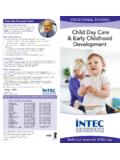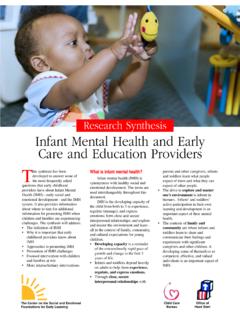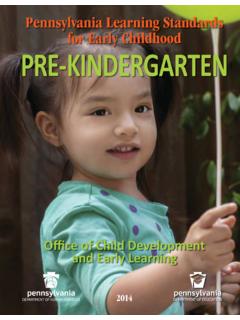Transcription of Encouraging Quality in Early Childhood Education …
1 1 Encouraging Quality in Early Childhood Education and Care (ECEC) RESEARCH BRIEF: PARENTAL AND COMMUNITY ENGAGEMENT MATTERS What is parental and community engagement? Parental engagement refers to the formal and informal relations that parents have with ECEC services. The engagement can take a variety of forms and meanings, depending on the Education stage of the child concerned ( , Early child care or preschool) and the perspective taken on the issue ( , Early years practitioner, teacher, parent, researcher). Literature often uses the terms family-school partnership , parental involvement , family involvement and parental engagement interchangeably. Community engagement refers to the connections between the ECEC services and all forms of input and contribution by community services to ECEC (Litjens and Taguma, 2010). Community can be defined as people from the same neighbourhood in a narrow sense or the whole community, including NGOs, etc.
2 In a broader sense. The most common and widely used parent and community engagement strategies (Oakes and Lipton, 2007; Epstein, 1995) can be summarised into six categories of constructive engagement. Table 1: Types of parental and community engagement Child-focused Communicating Design effective forms of centre-to-home and home-to-centre communications about programmes and children s progress. Parenting Help all families establish home environments to support children as learners ( , parenting classes). Stimulating development at home Provide information and ideas to families about how to help children at home with stimulating children s development and other curriculum-related activities, decisions and planning. Centre-orientated Volunteering Recruit and organise parent/communities help and support ( , helping to plan and run centre events and fundraising activities, accompanying trips, donating their time to improve facilities, or assisting in the centre and sharing their skills and expertise).
3 Decision making Include parents/communities in centre decisions, develop parent councils and parent-staff organisations. Collaborating with community Identify and integrate resources and services from the community to strengthen programmes, family practices and children s learning and development. Source: Adapted from Epstein et al., 1995. 2 What is at stake? Children spend the larger, if not largest, part of their young life in their direct home environment, interacting with their parents1, siblings, other family members and neighbours. Over the last decades, however, the amount of time children spend with their families and neighbours, as well as the types of interactions with them, have changed due to factors, such as changing family structures, increasing maternal employment and increasing immigration in many OECD countries (OECD, 2006).
4 Parents willingness to delegate part of the care for their children to ECEC services does not mean that the importance of the parent s role has diminished. It is still widely acknowledged that parental behaviour in the child s first five years is critical for the development of important academic and social skills and abilities. The current challenge for ECEC services is to embrace the crucial role of parents in young children s development and involve them in the services as much as possible (OECD, 2006). The continuity of children s experience across environments is greatly enhanced when parents and staff members exchange information regularly and adopt consistent approaches to socialisation, daily routines, child development and learning. When done well, it can improve the Quality of the centre, parenting at home, and the home-learning environment.
5 Families with low socio-economic status (SES) could particularly struggle to provide appropriate care and enrichment for children due to lack of resources to do so (Barbarin et al., 2008; Boyce et al., 2010; Ermisch, 2008; Feinstein et al., 2007, 2008; Hauser-Cram et al., 2003). Young children s development is not exclusively dependent on the input of parents and ECEC centres (day care, Early Education ). Children grow up in a neighbourhood and are part of a community. Therefore, it is important that different services formal ECEC services, day care, health services, out-of-school services work together and create a continuum of services that is reassuring for parents and can meet the needs of young children. Community involvement in ECEC is important not only for providing expanded services and referrals where necessary, but also as a space for partnership and the participation of parents.
6 Patterns of parental, family and community engagement in ECEC differ from country to country. Several formal and informal mechanisms are used to foster full participatory and managerial engagement. Some of the challenges to active engagement of parents include cultural, attitudinal and linguistic barriers. It is particularly difficult to ensure equitable representation and participation across families from diverse backgrounds (OECD, 2006). Why does it matter? Parental engagement The involvement of parents in young children s Education is a fundamental right and obligation. Both the OECD (2006) and UNICEF (2008a) argue that ECEC services should recognise mothers and fathers right to be informed, comment on and participate in key decisions concerning their child. Research shows that there is a substantial need and demand for a parental component in ECEC services (Desforges and Abouchaar, 2003).
7 Research also demonstrates that parental engagement in ECEC services enhances children s achievements and adaption (Blok et al., 2005; Deforges and Abouchaar, 2003; Edwards et al., 2008; Harris and Goodall, 2006; Powell et al., 2010; Sylva et al., 2004; Weiss et al., 2008). Examples of successful ECEC services that promote parental engagement ( , Early Headstart, the Perry Preschool and the Chicago Parent Centers from the United States) offer evidence that parental engagement matters (UNICEF, 2008b). The federally funded Chicago Parent Center s programme in the United States has been cited as evidence that parent participation has a major impact on children s academic success and social development, and that it is an effective strategy for reducing the dropout rate. Each year parents took part in the programme increased the chances by 16% that their child would complete high school.
8 For students whose parents were involved for the whole six years of the 1 For the purpose of this paper, the term parents refers to all carers holding prime responsibility for the upbringing and care of a child. 3 project, more than 80% graduated from high school, compared with 38% of students whose parents did not participate (Reynolds and Clements, 2005). Community engagement The involvement of wider community services ( , health or social services and sport organisations) or community members in ECEC plays an important role in the development of young children. Community support of the Early development process is considered as one of the characteristics common to high- Quality ECEC centres (Henderson et al., 2002). The earlier the role of the community in the lives of young children is recognised, the better the chances children have of achieving at school and in life in general (Cotton, 2000).
9 If the connection between schools and communities is strong, it is easier for children to develop the skills needed to be successful socially and emotionally, physically and academically (Edwards et al., 2008, Oakes and Lipton, 2007; OECD, 2006). Families with different socio-economic backgrounds (defined by factors such as parental Education , income and occupation) have different capacities to provide their children with a nutritious and healthy lifestyle, provide for Quality child care and invest in other learning resources, , books and visits to libraries and museums (Bradley et al., 1989). Family s socio-economic background is, therefore, powerfully associated with children s educational development (Duncan et al., 1998). A study of children adopted between the ages of four and six into families that vary widely in socio-economic backgrounds highlights the impact of the environment children grow up in (Duyme et al.)
10 , 1999). Adopted children (without any genetic links with their adoptive parents) have shown that non-genetic parents SES factors can impact the cognitive development of a child. The IQ of these children was measured before adoption, and all children, whether adopted by low- or high-SES families, had higher IQ s after adoption. But children adopted by higher-SES families had significantly larger gains in IQ than children adopted in lower-SES families because they were raised in richer, more stimulating environments. ECEC services, in collaboration with other services that can mitigate the negative effects of family backgrounds, are especially important for children with socio-economically disadvantaged backgrounds. In the child s environment (the family, the neighbourhood), risk factors have a negative effect on the child s development of intellectual skills, school achievement, social-emotional competence, social adjustment and health (Van Tuijl and Leseman, in press) even to the extent that poverty leads to irreversible effects on brain functioning (Hackman and Farrah, 2009).
















